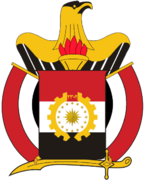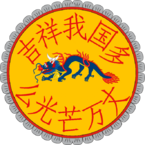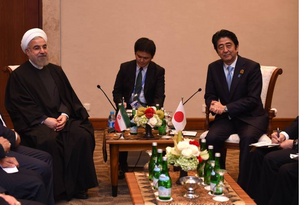Rongzhuo-Zahedan Axis: Difference between revisions
old>Xiaodong No edit summary |
Britbong64 (talk | contribs) |
||
| (16 intermediate revisions by 4 users not shown) | |||
| Line 1: | Line 1: | ||
{{WIP}} | {{WIP}} | ||
[[File: | [[File:Yuan Akbari.png|300px|thumbnail|right|[[Fazad Akbari]] (L) with [[Yuan Xiannian]] (R) in January 2020.]] | ||
The ''' | The '''Rongzhuo-Zahedan Axis''' is an unofficial term for the political, diplomatic, cultural, economic, military and historical relations between the [[Union of Zorasani Irfanic Republics]] (and its predecessor state the [[Union of Khazestan and Pardaran]]) and the [[Xiaodong|Auspicious Republic of Xiaodong]], which has been used to different degrees in different times in history. Although both Zorasan and Xiaodong have close relationships with many other nations, the level of cooperation between them in economic activity, trade and commerce, military planning and cooperation, commercial and military technology, and intelligence sharing has been described as "unparalleled" among regional powers. The two nations have been close allies since the mid-20th century, with their relationship being seen as underpinning both the [[Rongzhuo Strategic Protocol Organisation]] and the [[International Forum for Developing States]]. | ||
Both nations are considered to be ideologically aligned, with their state doctrines of [[Sattarism]] and [[National Principlism]] having been considered to have mutually reinforced each other. Both nations are considered to promote {{wp|nationalism}}, {{Wp|authoritarianism}} or {{wp|guided democracy}}, {{wp|anti-colonialism}}, {{wp|militiarism}} and {{wp|religious politics}} (with [[Irfan]] and [[Zohism]] respectively). | |||
Close relations between state leaders has also been noted; [[Ali Sayyad Gharazi]] and [[Chen Xuechang]], [[Ekrem Dalan]] and [[Han Guanzheng]] and [[Farzad Akbari]] and [[Yuan Xiannian]] have been noted to have especially cordial relations. Some leaders have denied the Rongzhuo-Zahedan Axis as special; under [[State Chairman of Xiaodong|State Chairman]] [[Sun Yuting]] for example Xiaodong refused to come to the aid of its ally in the [[Irvadistan War]], whilst tensions increased following 2005 when the new government of [[Hamid Alizadeh]] was frustrated by [[Jiang Zhongyu]]'s actions regarding Zorasan's Chanwan insurgency. Nevertheless most commentators state that since the early 2010's the relationship between Xiaodong and Zorasan has been the closest its been since the 1990's. | |||
== Comparison == | == Comparison == | ||
{| class="wikitable" | {| class="wikitable" | ||
|- | |- | ||
! | ! | ||
! {{flag| | ! {{flag|Zorasan}} | ||
! {{flag|Xiaodong}} | ! {{flag|Xiaodong}} | ||
|- | |- | ||
| '''Coat of Arms''' | | '''Coat of Arms''' | ||
| style="text-align:center" | [[File: | | style="text-align:center" | [[File:Emblem of Zorasan.png|145px]] | ||
| style="text-align:center" | [[File:Seal of Xiaodong.png|145px]] | | style="text-align:center" | [[File:Seal of Xiaodong.png|145px]] | ||
|- | |- | ||
| '''Flag''' | | '''Flag''' | ||
| style="text-align:center" | [[File: | | style="text-align:center" | [[File:Flag_of_the_UNIR.png|135px]] | ||
| style="text-align:center" | {{Flagicon|Xiaodong|size=135px | | style="text-align:center" | {{Flagicon|Xiaodong|size=135px}} | ||
|- | |- | ||
|'''Population''' | |'''Population''' | ||
| | |203,112,587 | ||
| | |553,746,000 | ||
|- | |- | ||
|'''Area''' | |'''Area''' | ||
| | |4,692,920 km<sup>2</sup><br>1,811,950 sq mi | ||
| | |6,898,573 km<sup>2</sup><br>2,663,554 sq mi | ||
|- | |- | ||
|'''Capital city''' | |'''Capital city''' | ||
|[[ | |[[Zahedan]] | ||
|[[Rongzhuo]] | |[[Rongzhuo]] | ||
|- | |- | ||
|'''Largest city''' | |'''Largest city''' | ||
|[[ | |[[Zahedan]] – 18,557,230 | ||
|[[Rongzhuo]] – | |[[Rongzhuo]] – 18,620,425 | ||
|- | |- | ||
|'''Government''' | |'''Government''' | ||
|[[ | |{{wp|Federation|Federal}} [[Sattarism|Sattarist]] {{wp|parliamentary republic}} | ||
|[[National Principlism|National Principlist]] {{wp| | |{{Wp|Unitary}} [[National Principlism|National Principlist]] {{wp|semi-presidentialism|semi-presidential}} {{Wp|repubic}} | ||
|- | |- | ||
|'''First leader''' | |'''First leader''' | ||
|[[ | |[[Mahrdad Ali Sattari]] | ||
|[[Lu Keqian]] | |[[Lu Keqian]] | ||
|- | |- | ||
|'''Current | |'''Governing body''' | ||
|[[State President of the Union|State President]] [[ | |[[Central Command Council]] | ||
|[[ | |[[State Presidium of Xiaodong|State Presidium]] | ||
|- | |||
|'''Current {{wp|head of state}}''' | |||
|[[State President of the Union of Zorasani Irfanic Republics|State President]] [[Vahid Isfandiar]] | |||
|[[State Chairman of Xiaodong|State Chairman]] [[Yuan Xiannian]] | |||
|- | |- | ||
|'''Current | |'''Current {{wp|head of government}}''' | ||
|[[ | |[[First Minister of the Union of Zorasani Irfanic Republics|First Minister]] [[Farzad Akbari]] | ||
|[[ | |[[Premier of Xiaodong|Premier]] [[Xi Yao-tong]] | ||
|- | |- | ||
|'''Governing political party''' | |'''Governing political party''' | ||
|[[ | |[[True Way]] | ||
|[[ | |[[Society for Restoring Benevolence]] | ||
|- | |- | ||
|'''Official languages''' | |'''Official languages''' | ||
| | |{{wp|Farsi|Pardarian}}<br>{{wp|Arabic language|Rahelian}} | ||
|{{wp|Mandarin Chinese|Xiaodongese}} | |{{wp|Mandarin Chinese|Xiaodongese}} | ||
|- | |- | ||
|'''Main religions''' | |'''Main religions''' | ||
| | |91.72% [[Irfan]]<br>3.89% [[Badi]]<br>3.02% [[Sotirianity]]<br>0.66% {{wp|Yazidism}} <br>0.40% {{wp|Druze}}<br>0.31% [[Atudism]] | ||
|62.4% [[Zohism]]<br>7.3% {{Wp|Chinese salvationist religions|Salvationist Sects}}<br>6.1% {{wp|Burmese folk religion|Chanwan Shamanism}}<br>5.6% [[Badi]]<br>18.6 other | |||
|- | |- | ||
|'''Ethnic groups''' | |'''Ethnic groups''' | ||
|''Non-official estimates'' | |''Non-official estimates'' | ||
| | |74.4% [[Xiaodongese people|Xiaodongese]]<br>8.8% {{Wp|Bamar people|Chanwan}}<br>4.3% {{wp|Tujia people|Ba}}<br>12.5% other | ||
|- | |- | ||
|'''GDP (nominal)''' | |'''GDP (nominal)''' | ||
|$ | |$1.919 trillion | ||
|$ | |$4.741 trillion | ||
|- | |- | ||
|'''GDP (nominal) per capita''' | |'''GDP (nominal) per capita''' | ||
|$ | |$9,450 | ||
|$ | |$8,562 | ||
|- | |- | ||
|'''GDP (PPP)''' | |'''GDP (PPP)''' | ||
|$ | |$2.639 trillion | ||
|$ | |$8.683 trillion | ||
|- | |- | ||
|'''GDP (PPP) per capita''' | |'''GDP (PPP) per capita''' | ||
|$12, | |$12,997 | ||
|$ | |$15,681 | ||
|- | |- | ||
| '''Real GDP growth rate''' | | '''Real GDP growth rate''' | ||
|7.1% (2016) | |7.1% (2016) | ||
| | |5.19% (2020) | ||
|- | |- | ||
|'''Military personnel''' | |'''Military personnel''' | ||
|3, | |3,712,000 | ||
| | |3,350,750 | ||
|- | |- | ||
|'''Labour force''' | |'''Labour force''' | ||
| Line 102: | Line 106: | ||
|} | |} | ||
== | ==Origins== | ||
===Great War and aftermath=== | |||
===Pardarian Civil War=== | |||
==History== | |||
===Early alliance (1950-1975)=== | |||
[[File:1965-8 1965 周恩来访问阿联酋会见纳赛尔总统.jpg|thumb|[[Chen Xuechang]] with [[Ali Sayyad Gharazi]] in 1960. The "Ali-Chen" partnership is seen as one of the most successful periods in the relationship between the two countries.|250px]] | |||
*Xiao support for the UKP in its cold war with neighbours. | |||
*Shared anti-colonial struggle | |||
===Nadir (1975-1984)=== | |||
*Already fraying as the new Xiao regime distrusting of Zorasan. | |||
*Failure of Xiao and Zorasan to support each other in Irvadistan War and Coastal Crisis. | |||
*Relations start to improve with the departure of Jahandar and Sun from power. | |||
===Reform period (1984-2005)=== | |||
[[File:Dalan Han.jpg|thumb|250px|[[Han Guanzheng]] and [[Ekrem Dalan]] in 2002 during the height of the reformist period.]] | |||
*Creation of ROSPO and IFDS. | |||
*Both nations support reforms to grow economies; measured multilateralism. | |||
*Ends in 2005 | |||
===Modern cooperation (2005-present)=== | |||
[[File:VolkanXiannian2.png|250px|thumbnail|right|Akbari and Yuan inspecting Zorasani troops in Zahedan, 2019.]] | |||
According to commentators and analysts, the Axis has seen its greatest improvements and strengthening under First Minister [[Farzad Akbari]] and State Chairman [[Yuan Xiannian]], with the two being said to have a very good relationship personally speaking. Through their efforts, the two have signed numerous trade and cultural agreements, including permanent student exchanges; an oil-for-coal agreement, arms deals and joint-declarations on seeking a new world order, that would end a top-heavy system and make sovereign nations equal. Both have expressed anti-globalist attitudes individually and together, while they see their partnership as key for offering leadership to the developing world. | |||
During his first visit as State Chairman to Zahedan, Yuan said that: | |||
{{Quote|"In Zorasan we have a friend, ally, mentor and student. In our mutual relationship we have much to share, much to learn and much to teach. We compliment one another in various areas and this is something, I and State President Isfandiar intend to utilise for the mutual benefit of both our nations. We have in our hands, the finest friendship in the world, one that is built solely on win-win, never zero-sum. We shall be shining examples to the developing world."}} | |||
In the summer of 2019, the Xiaodongese became the most vocal supporters for the Union's position with regards to the [[2019 Estmere-Zorasan Crisis]], while the Union government made strident efforts to support Xiaodong's economy, through direct-investment, lucrative energy deals, as well as the modernisation of the [[National Salvation Army]], which included the sale of heavy bombers, anti-ship missiles, two [[Mazdavand-class]] frigates and the deployment of 300 advisers to help train the NSA in counter-insurgency and counter-terrorism. That summer, First Minister Akbari declared: | |||
{{Quote|"The Rongzhuo-Zahedan Axis is now cemented in the world's international relations, we have our closest and dearest ally on the up, and that pleases us. We want a strong, wealthy and stable Xiaodong, because they deserve to be and Coius needs it. We, in the Union, remain committed to ensuring such a Xiaodong exists, we will do all possible, we will provide all asked for. Friends look out for one another and that is what we shall do."}} | |||
{{Quote|" | |||
It is said, that Volkan and Yuan speak on the phone at least once a week, for personal and professional reasons. They regularly discuss domestic happenings and exchange views and ideas on international events. | It is said, that Volkan and Yuan speak on the phone at least once a week, for personal and professional reasons. They regularly discuss domestic happenings and exchange views and ideas on international events. | ||
In | In 2018, Zorasani foreign minister Hadir Mourad expressed his personal desire to see Xiaodong's lost territories returned, telling Tasnim News, "when Xiaodong returns to its natural state, we can all relax because through that, a secure Coius emerges." | ||
[[Category:Zorasan]] | |||
[[Category: | |||
[[Category:Xiaodong]] | [[Category:Xiaodong]] | ||
Latest revision as of 07:53, 23 February 2021
This article is incomplete because it is pending further input from participants, or it is a work-in-progress by one author. Please comment on this article's talk page to share your input, comments and questions. Note: To contribute to this article, you may need to seek help from the author(s) of this page. |
The Rongzhuo-Zahedan Axis is an unofficial term for the political, diplomatic, cultural, economic, military and historical relations between the Union of Zorasani Irfanic Republics (and its predecessor state the Union of Khazestan and Pardaran) and the Auspicious Republic of Xiaodong, which has been used to different degrees in different times in history. Although both Zorasan and Xiaodong have close relationships with many other nations, the level of cooperation between them in economic activity, trade and commerce, military planning and cooperation, commercial and military technology, and intelligence sharing has been described as "unparalleled" among regional powers. The two nations have been close allies since the mid-20th century, with their relationship being seen as underpinning both the Rongzhuo Strategic Protocol Organisation and the International Forum for Developing States.
Both nations are considered to be ideologically aligned, with their state doctrines of Sattarism and National Principlism having been considered to have mutually reinforced each other. Both nations are considered to promote nationalism, authoritarianism or guided democracy, anti-colonialism, militiarism and religious politics (with Irfan and Zohism respectively).
Close relations between state leaders has also been noted; Ali Sayyad Gharazi and Chen Xuechang, Ekrem Dalan and Han Guanzheng and Farzad Akbari and Yuan Xiannian have been noted to have especially cordial relations. Some leaders have denied the Rongzhuo-Zahedan Axis as special; under State Chairman Sun Yuting for example Xiaodong refused to come to the aid of its ally in the Irvadistan War, whilst tensions increased following 2005 when the new government of Hamid Alizadeh was frustrated by Jiang Zhongyu's actions regarding Zorasan's Chanwan insurgency. Nevertheless most commentators state that since the early 2010's the relationship between Xiaodong and Zorasan has been the closest its been since the 1990's.
Comparison
| Coat of Arms | 
|

|
| Flag | 
|

|
| Population | 203,112,587 | 553,746,000 |
| Area | 4,692,920 km2 1,811,950 sq mi |
6,898,573 km2 2,663,554 sq mi |
| Capital city | Zahedan | Rongzhuo |
| Largest city | Zahedan – 18,557,230 | Rongzhuo – 18,620,425 |
| Government | Federal Sattarist parliamentary republic | Unitary National Principlist semi-presidential repubic |
| First leader | Mahrdad Ali Sattari | Lu Keqian |
| Governing body | Central Command Council | State Presidium |
| Current head of state | State President Vahid Isfandiar | State Chairman Yuan Xiannian |
| Current head of government | First Minister Farzad Akbari | Premier Xi Yao-tong |
| Governing political party | True Way | Society for Restoring Benevolence |
| Official languages | Pardarian Rahelian |
Xiaodongese |
| Main religions | 91.72% Irfan 3.89% Badi 3.02% Sotirianity 0.66% Yazidism 0.40% Druze 0.31% Atudism |
62.4% Zohism 7.3% Salvationist Sects 6.1% Chanwan Shamanism 5.6% Badi 18.6 other |
| Ethnic groups | Non-official estimates | 74.4% Xiaodongese 8.8% Chanwan 4.3% Ba 12.5% other |
| GDP (nominal) | $1.919 trillion | $4.741 trillion |
| GDP (nominal) per capita | $9,450 | $8,562 |
| GDP (PPP) | $2.639 trillion | $8.683 trillion |
| GDP (PPP) per capita | $12,997 | $15,681 |
| Real GDP growth rate | 7.1% (2016) | 5.19% (2020) |
| Military personnel | 3,712,000 | 3,350,750 |
| Labour force | 49.275 million | TBA |
| Mobile phones | 88,641,597 | TBA |
Origins
Great War and aftermath
Pardarian Civil War
History
Early alliance (1950-1975)

- Xiao support for the UKP in its cold war with neighbours.
- Shared anti-colonial struggle
Nadir (1975-1984)
- Already fraying as the new Xiao regime distrusting of Zorasan.
- Failure of Xiao and Zorasan to support each other in Irvadistan War and Coastal Crisis.
- Relations start to improve with the departure of Jahandar and Sun from power.
Reform period (1984-2005)
- Creation of ROSPO and IFDS.
- Both nations support reforms to grow economies; measured multilateralism.
- Ends in 2005
Modern cooperation (2005-present)
According to commentators and analysts, the Axis has seen its greatest improvements and strengthening under First Minister Farzad Akbari and State Chairman Yuan Xiannian, with the two being said to have a very good relationship personally speaking. Through their efforts, the two have signed numerous trade and cultural agreements, including permanent student exchanges; an oil-for-coal agreement, arms deals and joint-declarations on seeking a new world order, that would end a top-heavy system and make sovereign nations equal. Both have expressed anti-globalist attitudes individually and together, while they see their partnership as key for offering leadership to the developing world.
During his first visit as State Chairman to Zahedan, Yuan said that:
"In Zorasan we have a friend, ally, mentor and student. In our mutual relationship we have much to share, much to learn and much to teach. We compliment one another in various areas and this is something, I and State President Isfandiar intend to utilise for the mutual benefit of both our nations. We have in our hands, the finest friendship in the world, one that is built solely on win-win, never zero-sum. We shall be shining examples to the developing world."
In the summer of 2019, the Xiaodongese became the most vocal supporters for the Union's position with regards to the 2019 Estmere-Zorasan Crisis, while the Union government made strident efforts to support Xiaodong's economy, through direct-investment, lucrative energy deals, as well as the modernisation of the National Salvation Army, which included the sale of heavy bombers, anti-ship missiles, two Mazdavand-class frigates and the deployment of 300 advisers to help train the NSA in counter-insurgency and counter-terrorism. That summer, First Minister Akbari declared:
"The Rongzhuo-Zahedan Axis is now cemented in the world's international relations, we have our closest and dearest ally on the up, and that pleases us. We want a strong, wealthy and stable Xiaodong, because they deserve to be and Coius needs it. We, in the Union, remain committed to ensuring such a Xiaodong exists, we will do all possible, we will provide all asked for. Friends look out for one another and that is what we shall do."
It is said, that Volkan and Yuan speak on the phone at least once a week, for personal and professional reasons. They regularly discuss domestic happenings and exchange views and ideas on international events.
In 2018, Zorasani foreign minister Hadir Mourad expressed his personal desire to see Xiaodong's lost territories returned, telling Tasnim News, "when Xiaodong returns to its natural state, we can all relax because through that, a secure Coius emerges."


